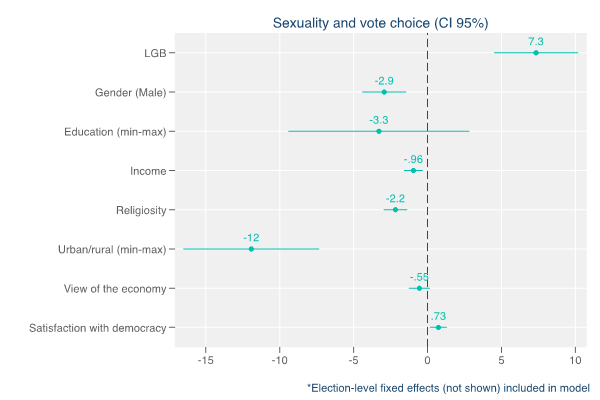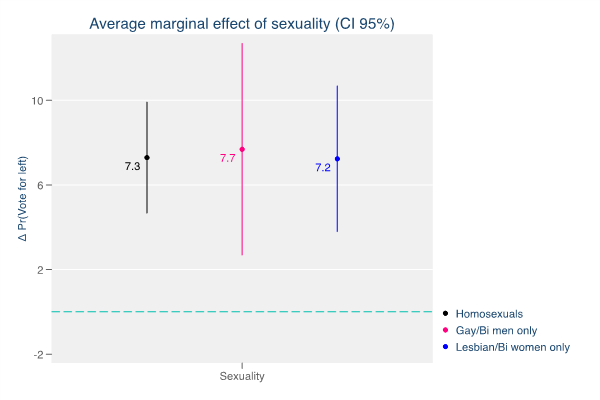How sexuality affects the choices of voters across Europe
Drawing on a new study, Stuart J. Turnbull-Dugarte demonstrates that sexuality has a significant impact on political behaviour across western Europe, with lesbian, gay and bisexual voters far more likely to back parties on the left.

Picture: Peter Lübeck (CC BY-NC-SA 2.0 licence)
In a recent study, I carried out what is likely to be the first large cross-national analysis of the voting preferences of lesbian, gay and bisexual (LGB) voters across western Europe. My findings indicated that in line with popular assumptions, LGB voters are far more likely to vote for parties on the left. I found a substantial ‘sexuality gap’ between voters across a number of countries that remained consistent over time.
LGB individuals make up a large minority within European societies, yet they represent a social group about whom we still know relatively little. Alongside other sexual minorities, LGB individuals have long been on the receiving end of both institutionalised and social processes of discrimination, which are likely to have had a formative role on their political beliefs and electoral preferences.
In carrying out my analysis, I assumed that voters tend to behave in a way that is congruent with their personal interests. Given that social democratic and other left-leaning parties have been those who have promoted policy positions that would expand the rights of LGB voters, I worked on the assumption that these parties have been able to bank the bulk of the so-called ‘lavender vote’. However, until now, there has been little empirical evidence to show that this is in fact the case.
The results
I used data from the European Social Survey (ESS), which includes more than 100,000 individuals who participated in around fifty elections across twelve countries in western Europe. The problem that political scientists face in the study of LGB (and T) electoral behaviour is a lack of data. The American National Election Study (ANES), the largest academic electoral survey in the US, has included a direct question that provides respondents with the opportunity to identify themselves as lesbian, gay or bisexual, but no such question has been included in any of the big national election studies in Europe, such as the British Election Study. We therefore have very little means at our disposal to analyse the potential divergence of political behaviour between different sexual minority groups.
To overcome this problem, I applied a novel approach for identifying LGB voters by leveraging data on the make-up of households. In short, the method involves subsampling the survey data to include only those who report living with their spouse or partner. I then matched the gender of individuals within the household. Those who share the same gender are identified as being in a same-sex relationship, which is a good indication of being LGB. With this approach of identifying LGB voters in hand, I was able to assess how the political preferences and electoral behaviour of voters across Europe is shaped by sexuality. I tested the effect of being LGB on ideology (identity on the typical left-right divide); support for a typical leftist policy position (support for economic redistribution); and actual vote choice.
The results, summarised in Figure 1, show that LGB individuals are, on average, around 7 percentage points more likely to support left-of-centre parties. The findings are important as they show that the predictive role of sexuality is actually more important than well-established correlations with support for the left such as income, education, religiosity or the urban/rural divide.
Figure 1: Modelling the effect of sexuality on vote choice
Note: For more information, see the author’s accompanying paper in the European Journal of Political Research
LGB voters are not only more likely to support parties on the left, the ideological bloc that has traditionally been the entrepreneur of pro-gay legislative efforts, but are also found to be supportive of traditional left-leaning policy objectives such as government policies aimed at reducing income inequality. Respondents identified as LGB were around four percentage points more likely to support state redistribution, a typical leftist policy position, vis-à-vis comparable heterosexual respondents.
Importantly, the effects are largely found to be consistent among men and women. The intersectional relationship between sex and sexuality might render asymmetric effects, but this does not appear to be the case. I ran a number of subsample models using sex as the subsampling indicator and found no significant difference between the two sexes. In other words, gay/bisexual men and lesbian/bisexual women appear to be equally more likely to vote for leftist parties in comparison to heterosexuals of the same sex, and the effect is also constant for the other outcomes (identification with the left and support for redistribution).
Figure 2: Asymmetric effect of sexuality across sexes
Note: For more information, see the author’s accompanying paper in the European Journal of Political Research
Of course, the political space within western Europe is more complex than a dichotomous characterisation between left and right. Notably, political parties are also spatially distributed across the green/alternative/libertarian vs. traditional/authoritarian/nationalist (GAL-TAN) cleavage, which involves policy concerns and political conflict over post-materialist concerns such as the regulation of social behaviour (such as same-sex marriage) as well as other salient issues like immigration and environmental regulation.
To cater for this, I also tested the persistence of the European LGB vote across the GAL-TAN dimension and identified parties who are socially liberal using data provide by the Chapel Hill Expert Survey. The results were largely consistent with the main model effects presented in Figure 1. This is, however, likely because of the high correlation between parties identified as being on the left and those identified as being liberal. Whilst multidimensionality varies across different European democracies, amongst those included in the analysis, most parties are placed within a singular left-liberal right-conservative space.
Ultimately, sexuality matters. Being LGB is a significant and noteworthy predictor of ideological preferences and vote choice in western Europe. This means that scholars working on individual-level political and electoral behaviour would do well to consider sexual minority status in their voting models. Of course, to do this, more has to be done to remedy the problems of data availability. I hope that my findings might do something to persuade those fielding large domestic or cross-national electoral surveys to include indications of sexuality. If we are to understand the divergent behaviour of this important minority within the electorate, we have to be given the tools to do so.
This article gives the views of the author, not the position of Democratic Audit. It was first published on LSE’s EUROPP – European Politics and Policy blog. For more information, see the author’s accompanying paper in the European Journal of Political Research.
About the author

Stuart J. Turnbull-Dugarte is a PhD Candidate in Political Science in the Department of Political Economy at King’s College London. He works on comparative politics in Europe and he researches political parties, electoral campaigns, and political behaviour. He tweets @TurnbullDugarte







 Democratic Audit's core funding is provided by the Joseph Rowntree Charitable Trust. Additional funding is provided by the London School of Economics.
Democratic Audit's core funding is provided by the Joseph Rowntree Charitable Trust. Additional funding is provided by the London School of Economics.